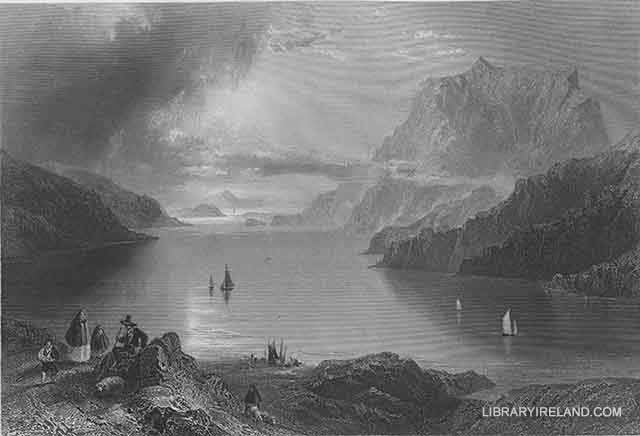Connemara, Its Wild Grandeur
CONNEMARA is rich in scenes of wild grandeur and beauty, but it has nothing in its secluded recesses more sublime and lovely than the LAKE OF KYLEMORE. It is very small, not more than two miles in length, and its shores are better wooded than most of the neighbouring country. The horizon from every part of this lake is nobly broken up by mountains—Maamturc, EAGLE MOUNTAIN, and other fine eminences breaking its low line in every direction.
From Kylemore to Clifden the road follows the tortuous windings of mountain-valleys, and skirting the base of the Twelve Pins, develops the finest variety of wild scenery in all Ireland. Clifden itself stands at the head of a narrow inlet of the sea; and the views of it from the eminences around are singularly fine. It has arisen something after the fashion of an American town, having attained its present growth in less than thirty years, and containing two or three streets, a chapel, a church, school-house, inn, &c. Thirty years ago not a house stood on its site. It is the property of Mr. D'Arcy, whose residence is Clifden Castle, two miles from the town; he has the merit of having founded the town. "He pointed out," says Inglis, "the advantages which would accrue to this remote neighbourhood from having a town and a seaport so situated; and he offered leases for ever, together with four acres of mountain-land, at but a short distance from the proposed site of the town, at twenty-five shillings per annum. This offer was most advantageous, even leaving out of account the benefit which would necessarily be conferred by a town on a district where the common necessaries of life had to be purchased thirty miles distant, and where there was no market, and no means of export for agricultural produce; and so the town of Clifden was founded and grew." One of the most beautiful walks in Ireland is the two miles from the town to Clifden Castle. The path runs by the edge of a long narrow inlet, the banks of which are very rugged. "
After reaching the entrance of the HARBOUR OF CLIFDEN, and rounding a promontory, the Castle comes into view. It is a modern castellated house not remarkable in itself, but in point of situation unrivalled. Mountain and wood rise behind, and a fine sloping lawn in front reaches down to the land-locked bay; while to the right the eye ranges over the ocean, until it mingles with the far and dim horizon." This part of the Emerald Isle is likely to rise to some consequence if the new schemes of improvement should be carried out; but it has been considered hitherto, by the Irish themselves, as almost a savage country. "Connemara," says a writer in the Penny Journal, "is a word which to English, and even to Irish ears, is expressive of nothing but the ultima Thule of barbarism. Yet its signification is most poetical—'bays of the sea.'
Towards the north-east extremity of the county of Galway there is a portion cut off, as it were, by a natural barrier of lakes and mountains. If the map does justice to its subject, Connemara will appear black with mountains, dotted with lakes, and studded with bogs; its coast will be seen rugged, and indented with fine harbours; while the inland country, though wild and mountainous, and ill-cultivated, and so little known and visited that its name is a proverb, is yet equal to the finest part of Wales or of Scotland; and the traveller who ventures to enjoy its romantic picturesque scenery, and who from natural or acquired taste can relish 'the lone majesty of untamed nature,' may here have his feelings gratified to the full. As a proof how little is known of this singular part of Ireland, it may be mentioned, that a magistrate in an adjoining county, when he heard that a criminal had been arrested who had long hid himself in the mountain fastnesses of these Irish highlands, declared that 'the poor fellow had suffered enough, in all conscience, for any crime he might have committed, by being banished seven years to Connemara.'"
The inhabitants of this part of the country are, of course, behind the rest of Ireland in knowledge and civilisation. But if the reader understands by this that they are barbarians, and destitute of the feelings of humanity, he commits a very great mistake. The Irish highlanders are a warm-hearted, generous people, attached to their wild mountains and romantic glens, and, considering the few advantages which they enjoy, a lively, intelligent race. In the old times their "mountain land" was the retreat of those daring spirits who scorned to submit to the yoke of an invader; and here, preferring poverty and freedom to restraint and submission, they found a shelter amid the deep valleys and craggy rocks, like the ancient Britons in Wales, and the Highlanders in Scotland.

